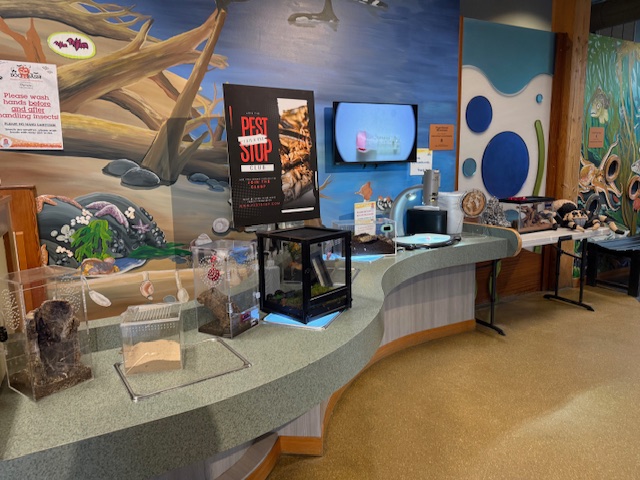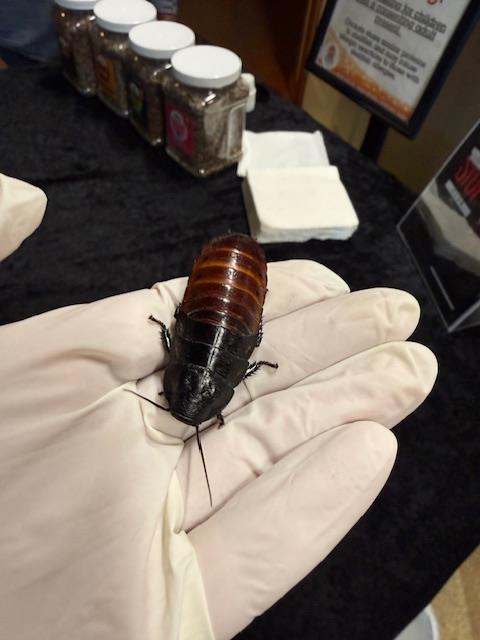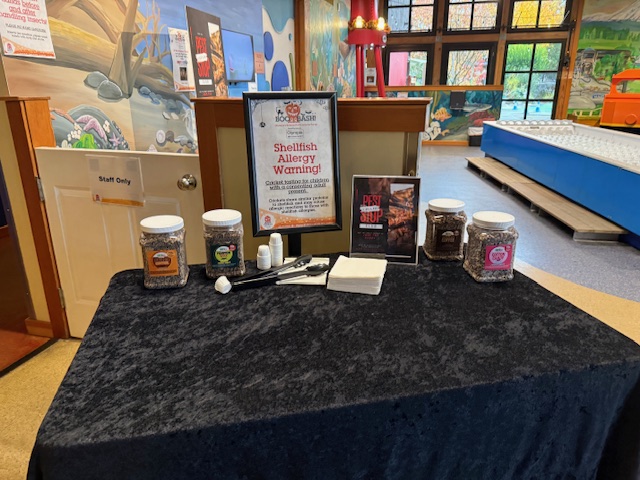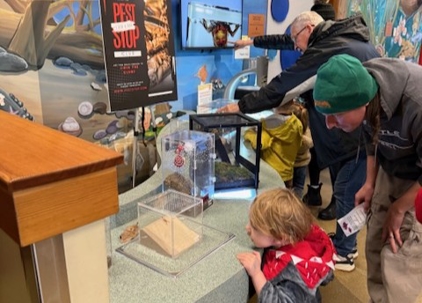The Boo Bash at the Hands On Children’s Museum in Olympia brought the usual mix of costumes, games, and excited families. We added something a little different to the evening: a table full of insects.

Watching kids and their parents gather around our exhibits showed why outreach matters. The event, which was featured by Pest Control Technology, gave families a relaxed way to explore topics that can feel unfamiliar. It also gave us a chance to show how our work fits into the broader environment around us.
A Bug Exhibit That Turned Curiosity into Important Conversations
Our table featured several live insects, among them hissing cockroaches, a praying mantis, a scorpion, and a colony of dampwood termites. Visitors moved in and out throughout the evening, pausing to study how each insect moved and to ask simple questions about their behaviors and roles in the environment.

A microscope station nearby offered a much closer look. Families examined prepared specimens of northern giant hornets and spotted lanternflies, two invasive species that have drawn growing attention in the Pacific Northwest. Seeing their features magnified helped people understand why these insects matter and how they influence local ecosystems.

We also brought a small cricket tasting setup. Cotton candy–flavored crickets ended up being the top choice. The tasting encouraged quick, easy conversations about edible insects and sustainability — topics that can feel abstract until someone has the chance to try them firsthand.

Why Hands-On Encounters Matter
Pest management is often reduced to the idea of getting rid of insects, but our work reaches well beyond that. We study how different species behave, where they thrive, and how they shape their surroundings. Even a brief interaction with a live or preserved insect can give people a window into that world.
We maintain a traveling collection of specimens for this reason. Bringing these displays to community events, classrooms, and trade shows helps us share the scientific side of our work in a way that feels approachable. Small observations can make the natural world feel more understandable.
We value these encounters, especially for children. Curiosity grows quickly when the subject feels accessible, and events like Boo Bash offer an easy starting point for learning and possibly inspiring the next generation of entomologists!
How Community Outreach Connects to Our Values
The conversations we had during the event aligned with the principles that guide our company. We aim to offer more than a quick fix when someone calls. Our work focuses on protecting homes while respecting the environment around them.
Every technician on our team considers that balance. Treatment choices, recommendations, and preventive steps are all considered carefully because they influence the plants, pollinators, and soil life that hold local ecosystems together.
Community outreach lets us explain that process in a natural, straightforward way. Showing someone why one insect benefits a garden while another harms it is similar to the conversations we have during service visits. The setting may change, but the goal stays the same: offer information that helps people understand and appreciate the natural systems around them.
Sustainability in Practice
Sustainability shapes our daily work at Pest Stop. Integrated Pest Management, or IPM, forms the foundation of every service plan. We begin with inspection, exclusion, sanitation, and habitat modification. Chemical treatments come last, used only when necessary.
We choose reduced-risk products when appropriate and rely on formulations designed to limit harm to people, pets, pollinators, and other non-target organisms. Timing matters as well. Avoiding bloom periods helps protect pollinators, and careful application techniques keep treatments focused on the intended area.
Our operations reflect the same values. Fuel-efficient route planning reduces emissions. Digital documentation cuts paper use. Technicians receive ongoing training in environmental guidelines and responsible product handling to keep our practices aligned with our mission.
We also stay involved in statewide conversations about sustainability, invasive species, agriculture, and public health. Our owner, Billy, serves in several leadership roles, including with the Washington State Pest Management Association, the National Pest Management Association, and Washington State University’s Pest Management Professional Advisory Committee. His involvement helps ensure that our field experience contributes to science-based decisions that support communities across Washington.
How We Support Environmentally Conscious Solutions
Many families and businesses want a plan that protects both their property and the environment. We build our services with that in mind. You can expect:
- A detailed inspection that identifies species and contributing conditions
- Clear explanations behind every recommendation
- Long-term prevention strategies
- Targeted treatments that limit impact on non-target species
- A service model that respects people, pets, and local ecosystems
Our goal is to provide solutions that are practical, safe, and grounded in science.
A Path Forward Rooted in Curiosity & Care
A busy museum may seem far removed from daily fieldwork, yet the connection feels natural to us. Curiosity sparks questions. Questions build understanding. Understanding supports better decisions for homes and the environment.
Our outlook has been shaped by many years in the field. We have been part of the region’s pest management landscape since 1975, and the collective experience of our team spans generations of work outdoors, indoors, and everywhere in between. Those years have taught us that lasting solutions begin with paying attention — to the insects, to the conditions that shape their behavior, and to the ecosystems they influence.
We plan to continue offering outreach that reflects our mission and values. Each event adds to the ongoing conversation about how people, insects, and ecosystems interact. Sustainable pest management begins with awareness, and awareness often begins with a single moment of curiosity.
If you have questions about the insects around your home or want to talk through a concern, we are always here to help.

